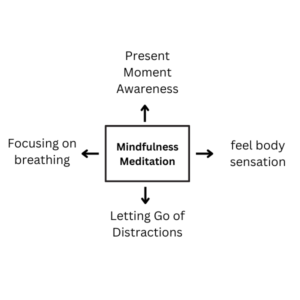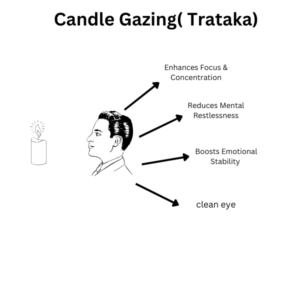Emotions are like waves—sometimes calm, sometimes turbulent, especially during tough times. Anxiety, sadness, and frustration can take over, making it feel like life has come to an end. But what if, instead of sinking, you learned to float? Meditation for mental stability. It doesn’t suppress emotions; instead, it helps you understand and transform them. Meditation teaches you to observe, understand, and master your emotions, as I discovered during one of the darkest phases of my life.
Just a few months ago, I was going through the roughest time of my life—a failed career and depression. For six months straight, it felt like time had stopped. Everything around me was still. One day, my friend suggested meditation, encouraging me to connect with the Universe, which she believed held answers to all our questions. At first, I was skeptical. How could simply sitting in silence help me? But I had nothing to lose. The first few days were difficult—I could barely sit for five minutes without anxiety consuming me. But slowly, things started to shift.
Through consistent practice, I realized that meditation for mental stability by allowing you to observe emotions without being overwhelmed by them. It helped me detach from negativity, cultivate self-awareness, and build resilience. If you’re struggling emotionally, meditation can be the key to regaining your balance and inner peace.
Meditation and Emotional Mastery
Through meditation, I began to notice small changes. I could sit for longer without distraction, my body relaxed, and my mind started to find peace. Most importantly, for the first time in 2 months, I felt a glimmer of hope.
Meditation helped me in ways I never imagined:
Self-Awareness: I realized that my emotions didn’t control me—I was in control of them.
Emotional Resilience: Instead of drowning in my problems, I started viewing them as temporary challenges.
Gratitude & Positivity: The world around me felt different—this provides me strength to resist the negative influences from the outside.I have started loving the things around me.
Connection to the Present: I understood that life hadn’t stopped—I had. Take charge of my journey,I now stay rooted in the present.
How Does Meditation Impact Your Brain's Emotional Centers?
How Does Meditation Impact Your Brain's Emotional Centers?
Meditation directly impact the brain structure and emotional regulation.its scientifically proven that regular meditation get strengthen and shrink some specific areas, that improve your emotional stabilit.
Amygdala Shrink (Fear & Stress Control Hoti Hai)—the Amygdala is an emotional center that regulates fear,stress,and anxiety.Meditation shrinks the Amygdala,helps individuals stay clam in stressful situations.
Prefrontal Cortex Strengthens(Improves Self-Control & Logical Thinking)—The prefrontal cortex is responsible for decision-making, focus, and self-control. Meditation strengthens the prefrontal cortex, leading to better emotional regulation.
Hippocampus Grow (Improves Memory and Emotional Intelligence)—This area is related to memory and learning.Meditation helps in growing the hippocampus, making you more emotionally stable and mindful.
Types of Meditation for mental stability
Studies shows that meditation helps in control your emotion for mental stability

1. Mindfulness Meditation
- Present Moment Awareness (Observing thoughts without judgment)
- Body Scan (Feeling bodily sensations)
- Focuses on the breathing- see your Inhalation and Exhalation process
- Letting Go of Distractions (Acknowledging and releasing thoughts)
How to do: Sit quietly, focus on your breath, and acknowledge emotions as passing clouds.

2. Loving-Kindness Meditation (Metta Meditation)
- Cultivates compassion and reduces anger.
- Promotes self-love and emotional resilience.
How to do: seat on a clean and quite place put one hand on you chest and another on stomach and repeat affirmations like “May I be happy, may I be peaceful” while visualizing loved ones.

Candle Gazing(Trataka)
- Enhances Focus & Concentration – Helps calm the mind and improve attention span.
Reduces Mental Restlessness – Trains the brain to stay still and present.
Boosts Emotional Stability – Reduces overthinking and helps with emotional control.
How to do: Sit in a dark room, place a candle at eye level, around 2-3 feet away,and focus on the flame without blinking for as long as possible.When eyes water, close them and visualize the flame internally.

4. Pranayama (Breathwork Meditation)
- Controls emotions by regulating the breath.
- Calms the nervous system, reducing stress and overthinking.
- How to do: Try “4-7-8 breathing”—inhale for 4 seconds, hold for 7, and exhale for 8
How Meditation Transforms Emotional stability
🔹 From Reaction to Response: Meditation trains the brain to pause before reacting impulsively.
🔹 Enhancing Emotional Intelligence: Regular practice improves self-awareness and emotional regulation.
🔹 Letting Go of Emotional Baggage: Meditation helps release past traumas by fostering a non-judgmental approach.
🔹 Strengthening Neural Plasticity: Long-term meditation rewires the brain to respond calmly to stressors.
Daily Meditation Routine for Emotional Stability
Morning: Start your day with 5-10 minutes of Pranayama, such as Anulom Vilom or Bhramari, before transitioning into meditation. Pranayama helps clear mental clutter, balances emotions, and enhances focus, making meditation more effective.
Mid-Day: Take a 2-minute pause to observe your emotional state.
Evening: Practice loving-kindness meditation to end the day with positivity
Q1: How long does it take to see emotional benefits from meditation?
➡ Studies suggest noticeable changes in emotional regulation within 4-8 weeks of consistent practice.
Q2: Can meditation help with anger issues?
Yes, mindfulness and breathing work meditation are highly effective in managing anger and promoting emotional balance.
Q3: What is the best time to meditate for emotional control?
Early morning or before bed are ideal times to calm the mind and regulate emotions effectively.